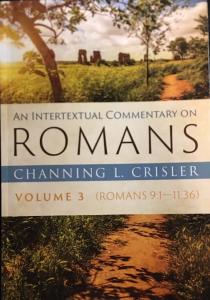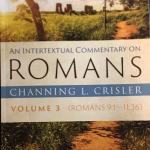We continue our interview with Dr. Channing Crisler on his new book, An Intertextual Commentary on Romans, Vol. 3 (Romans 9:1–11:36). This segment focuses on Paul use of Scripture, particularly Deuteronomy, in Romans 10 (pt. 1 focused on Romans 9). After Paul states that Israel, trying to bring about its own righteousness, has not submitted to the righteousness of God, he writes:
Rom 10: 4: For Christ is the climax (telos) of the law resulting in righteousness for everyone who believes. Rom 10:5 (Lev 18:5): For Moses writes with respect to the righteousness by the law that, “The person who does [these things] will live in [them].” Rom 10:6 (Deut 30:12): But the Righteousness by Faith thus says: “Do not say in your heart, ‘Who will ascend into heaven?’” that is, to bring Christ down, Rom 10:7 (Deut 30:13): or “‘Who will descend into the abyss?’” that is, to bring Christ up from the dead. Rom 10:8 (Deut 30:14). But what does she say? “The word is near you, in your mouth and in your heart,” that is, the word of faith which we proclaim.

Some scholars suggest that Paul uses pesher in this passage. This refers to an interpretative approach or exegesis used in certain ancient Jewish texts, especially by the Qumran community of the Dead Sea Scrolls. It approaches Scripture often in a commentary-like fashion that assumes a new divine disclosure relevant for the era of the community reading the text. The interpretation is typically derived from prophesies in Scripture. Pesher may be characterized also by a formula like, “Its interpretation concerns…” Pesher Habakkuk (1QpHab) is a prime example from the Qumran community.*
Oropeza
Is Paul using pesher by bringing out new revelation through his interpretation of Deuteronomy in Romans 10:5–8? Here the righteousness by faith is personified as the subject in this text. She “speaks” from Deuteronomy, and Christ is supposed to be the one who makes the ascent and descent. And the “word” is about the faith that Paul proclaims—the gospel.
Crisler
One could refer to Paul’s exegesis of these verses as “pesher-like.” In keeping with pesher exegesis, Paul’s interpretation of Leviticus 18:5 and Deuteronomy 30:12–14 is embedded in his citation of these pre-texts.
Also, in keeping with pesher exegesis, Paul’s interpretation has an apocalyptic element, especially if we read his engagement with Deut 30:12–14 in Rom 10:5–8 alongside his engagement with Joel 2:32 (3:5 LXX) in Rom 10:13. To “call on the name of the Lord” in Paul’s reading of Joel is to call upon the Lord Jesus for deliverance from sin, death, and the eschatological judgment. This judgment looms over the age now ruptured by God’s work in Jesus.
Oropeza
And what about Leviticus 18:5?
Crisler
The treatment of Lev 18:5 and Deut 30:12–14 is neither a proverbial maxim nor the constructions of an ad hoc argument as some scholars suggest. A few observations are in order here:
First, Paul marshals the voices of “Moses” (Lev 18:5) and the “righteousness of faith” (Deut 30:12–14) to confirm and explain how Christ is the “end of the law” (Rom 10:4). In doing so, Paul does not cite Lev 18:5 in a contextual vacuum or ad hoc sense.
Rather, Paul has an awareness of the larger context of Leviticus and Israel’s ancient history which, as he sees it, indicates a failure to live before God in a way that would secure life for them given their disobedience to the Mosaic Law. Ancient failure to find life through obedience to the law portends eschatological failure on the same basis. Both Moses (Deut 32:1–43) and Paul recognize this reality for Israel.
Second, the interplay between Deut 30:12–14 and Rom 10:6–8 signal that Paul respects the wider context of Deuteronomy, which in turn informs our understanding of his pesher-like interpretation.
Oropeza
Personally, I would translate the Greek word telos in Rom 10:4 as climax or fulfilment, and it conveys a different sense depending on who it pertains to. In other words, Christ is the “goal” of the law for believing Jews, and the “end” of the law for believing gentiles (those who were once god-fearers and proselytes). With the nuance of “end” I would suggest this does not mean that the Torah is abolished in principle; Paul will uphold the fulfilment of the Torah’s commandments in Rom 13:8-10. Given the imagery of running, pursuance, stumbling, and falling pervasive in Romans 9–11, Christ may be seen as the metaphorical finishing line of the race, or trek to Zion, that Israel and the nations aim to reach as well as complete, and hence, the notion of fulfilment.
Anyway, you say that Paul respects the wider context of Deuteronomy. How so?
Crisler
What Paul finds in Deut 30:12–14 is a pattern for how God brings his word of instruction to his people. Acquisition of the law did not require a feat of superhuman strength on the part of ancient Israel. Rather, God placed the law in their mouths and hearts. He did not require them to ascend to the heavens or descend to the abyss to acquire the law.
Similarly, no such feats are required for Paul’s Jewish kinsmen. Christ has descended to those kinsmen in keeping with the pattern established in the giving of the law. He brings it to their mouths and hearts through Paul’s preaching of the gospel.
Moreover, belief in the gospel that Paul preaches is tantamount to obedience from the heart discussed in the wider context of Deuteronomy 30. For Paul, loving God with the whole heart as outlined in Deuteronomy 30 is a matter of faith in the word that God brings so near to them, as near as the law was brought to their ancestors.
Oropeza
I’m looking forward to part three of our discussion!
Note
* See, for example, Liora Goldman, “Pesher” in Encyclopedia of Second Temple Judaism, eds. Loren T. Stuckenbruck & Daniel M. Gurtner (T. & T. Clark, 2020), 2:600–602.


















